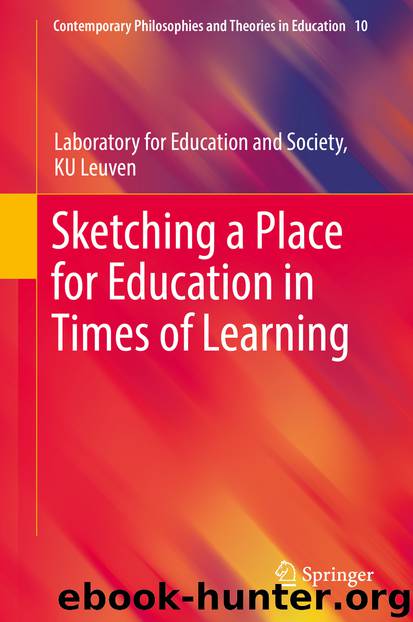Sketching a Place for Education in Times of Learning by Laboratory for Education & Society

Author:Laboratory for Education & Society
Language: eng
Format: epub
Publisher: Springer International Publishing, Cham
Universitas is the Latin word for association. The complete denomination for what we now call “universities” was universitas magistrorum et scholarium, i.e. a community of masters and/or students. Since its medieval inception, the university was a gathering of people thinking together about a matter of interest to them, usually framed as a theory, a book, or a problem. This thinking together did not happen spontaneously, people had to create an institutional framework to support it: they gathered at certain times of the day in certain houses to read particular texts, to teach them, to debate them. Masters were paid to teach certain books, students were expected to be on time for the classes. It is precisely this realization of the institutional framework for thinking together that created the distance from the world following the establishment of the universities. The river that had separated Abelard’s forest school from the city was now internalized. Even though the students moved back to the city, and although the walls of the university were physically inside the city, the university itself did not belong to the city or to the church. The university was distinct, in its juridical status, from them both, despite these powers trying to make it fit their needs.
The functionalist view is correct insofar as it points to the actual historical motives that lead to the foundation of a university. For those endowed with political power, the universities offered potential solutions to certain issues. We only need to look at the foundation of the University of Bologna to understand what was at stake there politically. Before the student-university of Bologna was founded, there were already many schools in the city teaching liberal arts. At that time, the old Roman law – the Corpus Juris Civilis – was not really used in practice, but rather regarded as a prestigious reference for the few lawyers who knew about it. In the political fights that emerged between the Emperor and the Pope, Roman law became a weapon for one side, carrying with it the authority of the ancients. Thus, at a time when political battles started to be fought in juridical terms, “the struggle between the Empire and the Papacy was essentially a battle of ideas” (Rashdall 1895). Since soldiers were needed to fight on this ground with the weapons of law and reasoning, some form of training was required. Matilda of Canossa was the informal patron of the Bologna school of law, and encouraged scholars to teach Roman law. The concrete aim at Bologna was to create a critical mass of experts in Roman law who could impose it as the prevailing legal framework and, in the long term, win the political war against the Papacy. Thus, the University of Bologna emerged when the masters of law gathered in an association to teach law by focusing only on one book, the Corpus Juris Civilis. Previously, law was taught as a part of rhetoric, in the arts schools, yet now it emerged as a separate discipline with its own faculty.
Download
This site does not store any files on its server. We only index and link to content provided by other sites. Please contact the content providers to delete copyright contents if any and email us, we'll remove relevant links or contents immediately.
The Art of Coaching Workbook by Elena Aguilar(51139)
Trainspotting by Irvine Welsh(21612)
Twilight of the Idols With the Antichrist and Ecce Homo by Friedrich Nietzsche(18605)
Fangirl by Rainbow Rowell(9215)
Periodization Training for Sports by Tudor Bompa(8237)
Change Your Questions, Change Your Life by Marilee Adams(7719)
This Is How You Lose Her by Junot Diaz(6857)
Asking the Right Questions: A Guide to Critical Thinking by M. Neil Browne & Stuart M. Keeley(5741)
Grit by Angela Duckworth(5577)
Red Sparrow by Jason Matthews(5451)
Paper Towns by Green John(5164)
Room 212 by Kate Stewart(5091)
Ken Follett - World without end by Ken Follett(4706)
Housekeeping by Marilynne Robinson(4421)
The Sports Rules Book by Human Kinetics(4367)
Double Down (Diary of a Wimpy Kid Book 11) by Jeff Kinney(4252)
Papillon (English) by Henri Charrière(4238)
The Motorcycle Diaries by Ernesto Che Guevara(4073)
Exercise Technique Manual for Resistance Training by National Strength & Conditioning Association(4049)
